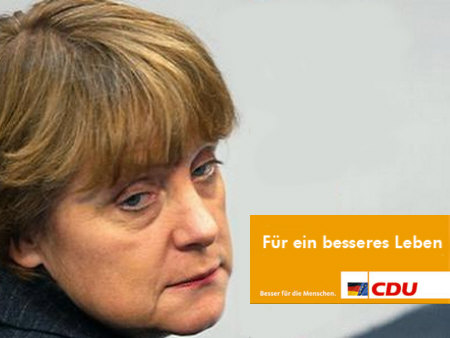
German Chancellor Angela Merkel’s Christian Democratic Union was fined 1.2 million euros ($1.6 million) for breaching party donation rules, adding to the CDU’s difficulties as it prepares to fight seven state elections.
The fine was imposed by the lower house of parliament in Berlin, the Bundestag, for party funding violations in the western state of Rhineland-Palatinate at the time of a regional election in 2006, according to a statement posted today on the parliament website citing Bundestag President Norbert Lammert.
The CDU’s parliamentary group in the state paid 401,000 euros in contracts to lobby firms “with the aim of giving financial support to the party’s election campaign” and thus saving expenses, the statement said. “These savings are to be apportioned to the party as an inadmissible donation” under German laws on political party funding.
The finding is a blow to Merkel as she struggles to rally voter support ahead of elections next year in seven of Germany’s 16 states. Trailing the opposition nationally as taxpayers grumble over the cost of the euro-area debt crisis, Merkel goes into the regional elections in less than two months lumbered with a Free Democratic federal coalition partner that is polling below the level needed to win parliamentary seats.
In Rhineland-Palatinate, where Helmut Kohl ruled as state prime minister from 1969 to 1976 before he went on to become chancellor, Merkel’s CDU has in recent weeks been closing on the ruling Social Democrats led by current state premier, Kurt Beck.
Even so, polls suggest Beck could stay in office after the March 27 election by forming a coalition with the Greens. In 2006, Beck beat the CDU so comprehensively that he was able to form a government without need of a coalition partner, the only such administration in Germany.
In neighboring Baden-Wuerttemberg, which also votes on March 27, the ruling coalition of CDU and Free Democrats is at risk of being ejected, polls show. Likewise in Hamburg, opinion polls suggest Merkel’s party is unlikely to retain power after Feb. 20, the first of the state elections.
Votes will also be held next year in Saxony-Anhalt, Bremen and Mecklenburg-Western Pomerania, with the final ballot in Berlin, both the capital city and a federal state, on Sept. 18.
RELATED ARTICLES
- EU to use Russian assets to buy arms for Ukraine
- German School Bans Children from Drinking Water Because its Offensive
- Turkish students film themselves beating and torturing 12-year-old German child
- Germany will arm Ukraine with Indian Artillery Shells
- Ukrainian refugee killed in Germany by other refugees because of his Nationality











